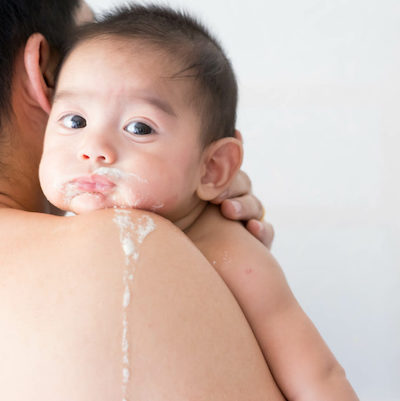
Medically reviewed by Raye Mariano – RN, BSN, BA
If you have a baby on the way or you’ve just had a new baby, then you’ve got plenty of things to do to prepare. You’ve probably done lots of reading and maybe stocked up on all the big essentials like bottles, burp cloths, pumping equipment, etc. The truth is that no matter how much you prepare in advance, there are always going to be unexpected situations that pop up once your newborn baby arrives.
Some of these unforeseen circumstances can be messy and stressful. If you know anything about babies then you are probably aware that babies spit up – a lot. You may even be surprised to find out just how much. However, did you know that you might even see milk coming out of your baby’s nose?
It might be alarming, or even scary, seeing breast milk or formula come out of your baby’s nose if you weren’t expecting it. You might be worried that it isn’t normal or that it’s something you should be concerned about. You might even panic not knowing what to do.
Well, believe it or not, if milk comes out of your baby’s nose it is actually perfectly normal and quite common. What you are seeing is called nasal regurgitation1. Rest assured, regurgitation (or reflux) occurs very frequently in both breastfed and bottle-fed babies2 so it’s super helpful to be well versed on the subject and know what to do when it happens to you and how to help your little one.
This article is not a substitute for medical advice or consultation.
Why Is Milk Coming Out Of My Baby’s Nose?
What is nasal regurgitation and why is it happening? Regurgitation from the nose is actually not much different from when it comes out of baby’s mouth – it is just taking a different route3. So, basically it’s pretty much just like regular spit-up and caused by the same factors.
Although nasal regurgitation doesn’t happen to every baby, it could very well happen to yours and certainly when you least expect it. Even if your baby doesn’t ever have milk come out of their nose, it’s important to understand why regurgitation happens at all because your baby will surely spit up at some point.
Here are some reasons why your baby might be spitting up or have milk coming out of their nose.

1. Taking In Too Much Air While Feeding
If your baby is extremely hungry they will be sucking vigorously on the bottle or breast in attempt to get the milk as fast as they can. In this situation, the baby swallows air with the milk. As these swallowed air bubbles try to escape, some milk comes with it leading to spit up either via mouth or nose4.
You can avoid this by sticking to your baby’s feeding schedule so they don’t become overly hungry. Small, frequent feeds are generally recommended for newborn babies5. They can also swallow air when upset or anxious prior to being fed and so they might suck more excessively in an attempt to soothe themselves.
2. Overfeeding
Another reason that you might witness nasal regurgitation is that some babies are drinking too much milk in one sitting. That might be due to you giving them too many ounces in a bottle or because they don’t realize they are actually full. If your baby’s stomach becomes too full of milk, it will actually overflow and thus milk will come up out of their mouth and/or nose.
3. Feeding Distractions
Sometimes babies get distracted while feeding, usually when they get a bit older and are more concerned with taking in their surroundings. For instance, it might be too noisy or too bright or there is a lot of people around. The baby might forget to swallow leading to a mouth full of milk and then to baby choking on it a bit. Then it comes right up through their nasal passage.
4. Immature Digestive System
Many new babies have digestive systems that are not fully developed yet, especially premature babies. Specifically, the connection between the stomach and the esophagus (called the lower esophageal sphincter muscle) hasn’t fully formed yet. An immature stomach valve makes it very easy for milk to flow back up from the stomach through the esophagus and into the nose6.

5. Allergies
Some babies experience reflux due to allergies or sensitivities and a common substance that causes these adverse reactions is cow’s milk. Cow’s milk allergies can affect breast fed babies if your diet contains dairy and it also affects formula fed babies as their are cow’s milk proteins in the formula milk7.
If you are noticing other problems along with the nasal regurgitation, like baby is not gaining weight or is extremely uncomfortable after feeds-consult the pediatrician about the possibility of this type of allergy affecting your baby’s body.
6. Coughing Or Sneezing While Spitting Up
Another reason for the milk coming out of your baby’s nose could just be coincidentally that they just so happened to be coughing, sneezing, or hiccupping at the same time as spitting up. This increases the pressure on the baby’s esophagus and the milk might just shoot out of their nose8.
7. Breastfeeding: Why Is Breast Milk Coming Out Of Baby’s Nose While Nursing?
For breastfeeding mothers, milk may be coming out of baby’s nose for a different reason entirely. This could be an improper latch. If your baby’s mouth is not properly secure onto the breast with too much space between the breast and baby’s upper or lower lip then they can swallow too much air with breast milk.
Be sure to check baby’s mouth during feeds to ensure the proper latch as it can lead to a host of issues. Trying different breastfeeding positions might help you find one that works best for you and your baby.

What To Do If Milk Comes Out Of Baby Nose?
Here’s what you should do when you see milk coming out of you baby’s nose:
- Don’t panic – Try not to get frazzled and remember it happens to babies all the time.
- Be gentle – Keep a smile on your face as you clean up your baby so your reaction doesn’t startle them or make them upset or think they did something bad. This might create a negative association with feeding.
- Clean up – Grab your baby’s burp cloth and gently wipe away the milk from their nose and/or mouth.
- Soothe the baby – Cuddling or skin to skin contact to calm down your baby who might be upset now.
How To Prevent Milk Coming Out Of Baby’s Nose & Reduce Spit Ups
It might come as a relief to hear just how common it actually is and that it isn’t all that serious of a problem if it happens once in a while. However, if milk coming out of baby’s nose is happening frequently or in large amounts, there are things you can do to reduce nasal regurgitation or spit ups in general.
- Always burp!
Make sure you stop mid-way through each feed for burping your baby and then at the end of each feed as well. A good burp will let out the excess air so it doesn’t get trapped.
- Avoid overfeeding
Don’t give more milk than baby’s stomach can handle at each feed. Pay attention to your baby’s cues. If they are slowing down, pulling away from the bottle, or if baby falls asleep with the bottle in their mouth then it’s better to take it away before they consume too much.
- Keep baby more upright for feeds
Keeping your baby in an upright position during feeding will prevent milk from coming back up baby’s esophagus and allow his or her belly to settle9. Practice different feeding positions to ensure you are both comfortable but that baby is still in an upright position.

- Quiet and distraction-free environment
Eliminating distractions during baby’s feeds will prevent him or her from forgetting to swallow and they will be able to pay attention to when their stomach is full.
- Pacifier
Often babies will comfort suck on either the breast or the bottle to soothe themselves. Following a feed, try taking out the bottle or breast from baby’s mouth and replacing it with the pacifier. That way they aren’t just sucking and getting more milk when they aren’t even hungry.
- Slow flow nipples (if bottle feeding)
Sometimes if the hole is too big for your baby, they can’t handle the amount of milk passing through which causes them to swallow too much air. They actually make nipples with a smaller hole that you can replace your other nipples with. The smaller hole allows them to pace themselves while bottle feeding.
- Loose clothing
Sometimes regurgitation in general is caused by baby just being too full with too tight of clothes on. Make sure they have loose comfortable clothes that don’t put too much pressure on their little belly.
- Postpone tummy time
This might sound obvious but don’t forget to wait until after baby has digested their feed to move on to tummy time. Putting a baby with a belly full of milk right onto their stomach could upset baby’s tummy and for sure make it come right back up into their mouth or nasal passages!
Actually trying to do tummy time shortly after feeding is one of the reasons why babies don’t like tummy time! We can’t blame them, it’s really uncomfortable to lay on your belly when you’re full after meal!

Is Milk Coming Out Of Baby’s Nose Normal?
Now we know why milk might come trickling or shooting out of your baby’s nose but is it normal? Actually, yes! Regurgitation of milk is so common that it it happens to babies every single day. While it doesn’t always come out of your baby’s nose every time, you will more than likely experience your baby spit up at least a handful of times.
Whether it comes out of the baby’s nose or mouth is besides the point as they are basically the same thing since the nose and mouth are connected.
Gastroesophageal reflux, or sometimes just called “reflux” affects 50% of 0-3 month olds every day. That number even rises to 67% of four-month-olds10!. Hopefully that’ll make you feel better if it happens to your baby.
Is It Bad If Milk Comes Out Of Baby’s Nose?
Milk dribbling out of your baby’s nose doesn’t necessarily mean anything is “wrong”. It also doesn’t usually bother the baby all that much either. You might just end up having to change the baby’s spit up outfit (and maybe yours) and then having to do some extra laundry but that’s about it.
When Do Babies Stop Spitting Up?
The good news is that all of this spitting up and nasal regurgitation doesn’t last too long in the grand scheme of things. Studies show that usually babies stop spitting when they are about 1 year old11.
By this time most babies are spending more time in an upward position (i.e. sitting up unassisted or walking). Also, by this age a baby’s digestive tract is more developed and most have started to eat solid food12.

Milk Coming Out Of Baby’s Nose: How To Tell The Difference Between Spitting Up Vs. Vomiting
It’s important to distinguish the difference between spitting up and vomiting because they are not the same and are caused by different factors.
Spit-up (whether from the mouth or nose) usually flows out gently without much distress and is a smaller amount. On the other hand, vomiting comes out forcefully due to the stomach muscles contracting and is generally a much larger amount13.
Vomiting can be caused by other things like a stomach virus, motion sickness, or even something like an intestinal blockage. Frequent vomiting is definitely not something to be overlooked.
Signs that what you’re seeing is actually vomit and not just spit up of breast milk or formula
- Comes out as projectile or as a forceful spray
- Contains entire stomach contents, not just ingested milk
- Larger amount than normal spit up
- Causes discomfort or distress for baby
When To Talk To A Doctor
In addition to vomiting, there can be instances where baby’s spitting up happens excessively and is actually due some underlying issue. The signs below indicate the necessity for a trip to your baby’s pediatrician for further evaluation:
- You notice milk coming from your baby’s nose after every feed
- Your baby isn’t gaining weight or is losing weight
- You notice a strange color-yellow or green tinge
- Your baby spits up blood
- Your baby arches their back and neck after feeds
- Your baby often seems uncomfortable or distressed after a feed, or they show frequent gagging, choking, burping, more than seems normal to you
- Your baby is refusing to feed or cries every time they spit-up
- Still spitting up frequently even after one year of age
- Your baby is having difficulty breathing- call 911 immediately or go to nearest emergency room
Article By Raye Mariano, RN, BSN, BA
Raye Mariano is a Registered Nurse who worked for years as a labor and delivery nurse and mother/baby nurse. Now, as a stay-at-home mom to 3 kids, ages 4 and under, she remains passionate about all things pregnancy, postpartum, and parenting.
The purpose of this article is informative. It’s not a substitute for professional medical advice or medical care. Remember: safety first! Consult your doctor/pediatrician in case of any doubts. The author of this article does not accept any responsibility for any liability, loss or risk, personal or otherwise, incurred as a consequence, directly or indirectly, from any information or advice contained here.
References:
https://www.ncbi.nlm.nih.gov/
https://www.healthychildren.org/
https://www.texaschildrens.org/
https://www.momjunction.com/
https://www.mayoclinic.org/
https://jamanetwork.com/
https://momlovesbest.com/

